Almost a week after the PUBG app was banned in India, there has been hectic activity on part of the South Korean company PUBG Corp to revive the app in India and to keep its hold in the Indian market. The first step in this regard has been to severe ties with the Chinese gaming company Tencent Games and retain the publishing rights for India with itself.
On the other hand, it wants an Indian gaming company to handle its distribution in the country. All this has been done to revive the app in India and it needs to be seen whether such a move will pacify the Indian government in revoking its ban on PUBG in India. With over 175 million downloads from India and around 50 million monthly active users, PUBG was definitely a significant player in the Indian e-sports industry.
“For PUBG specifically, India is an important market. It was the top grosser amongst mobile games in India. For a company like PUBG, which is on a pathway to unit economics, retaining such a core user group like this is critical. Essentially, games also function like studios, with the success of a current game driving the funding and user base for the next which is critical to their long term viability. A sudden turning off of the tap to an entire market like India, with its size and scale, can ring the death knell for a company,” observed Utkarsh Sinha, managing director of Bexley Advisors, a boutique investment bank firm.
PUBG has a huge support base of active gamers in India—more than 10 per cent of its global user base, which PUBG Corp cannot afford to lose. “Gaming being an extremely fast growing industry may throw up quick alternatives which would entice user creation at a rapid pace. Investments made in PUBG by gamers would also be a flashpoint for continuity if the ban persists in India,” said Subramanyam Sreenivasaiah, CEO of Ascent HR.
“With the ban, the problem is not just immediate impact or a short term glitch, but a massive potential loss, primarily because gaming is a habit. Once gamers move on to some other option (and there are lots available including FreeFire which is the leader) to bring them back is not going to be easy. Also, in multiplayer gaming, it’s a community phenomenon. You will go where your gang is, so unless they are able to come back soon and we hope they do, it will for all practical purposes be starting from scratch again,” pointed out Vaibhav Odhekar, co-founder and COO of POKKT, an in-app mobile gaming ad platform.
For PUBG, current numbers in India are just the tip of the iceberg. The potential growth in these numbers is huge, as the players and game content consumption numbers in India are seeing a big increase. “What the developers have their eye on and want to take advantage of, are the growing numbers. Hold on to the current huge numbers and also be there to capture the growth that will happen, if they are able to maintain their presence in India. One can very well imagine the possibilities when the Indian market gets into full steam,” said Manvendra Shukul, CEO and co-founder, Lakshya Digital.
It needs to be seen whether the ban of PUBG will finally be revoked as PUBG has a huge number of users in India already. It has been reported that PUBG Corp is hoping to work with the Indian government and wants to get the app operational again.
“With growing penetration of smartphones, easy access to internet connectivity and the huge number of young people adopting mobile gaming for entertainment, their future is bright. Moreover, the number of people adapting gaming as a formal method of entertainment is growing fast. The customer base isn’t restricted to the kids and young adults. So, it’s a huge market that they cannot afford to ignore,” Aditya Narayan Mishra, director and CEO of CIEL HR Services, told THE WEEK.
As per a report by Maple Capital Advisors, the overall gaming is at inflexion stage in India with rapid rise in consumption expected and investments likely to accelerate. The report states that between 2014 and 2020, the total Venture Capital (VC) funding in Indian gaming start-ups was $350 million. It is growing at a CAGR of 22 per cent. Recent trends indicate that the growth is accelerating. The segment has also witnessed increased overseas investments and partnerships, given its growth trajectory. VC’s such as Sequoia, Accel, Kallari, Blume, Steadview, Matrix have made meaningful investments in gaming in the country. The report also observes that while the number of transactions in platforms led the investments, value wise real money and e-sports-led investments.



